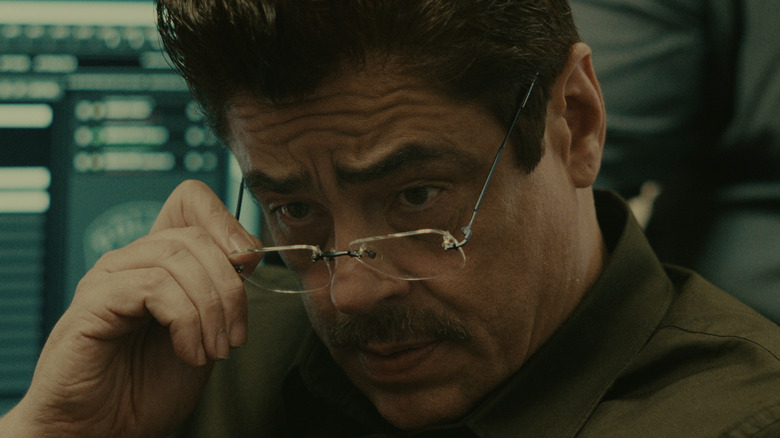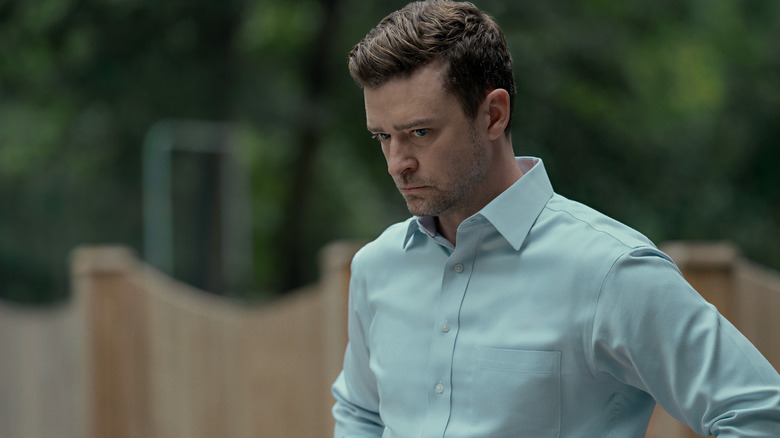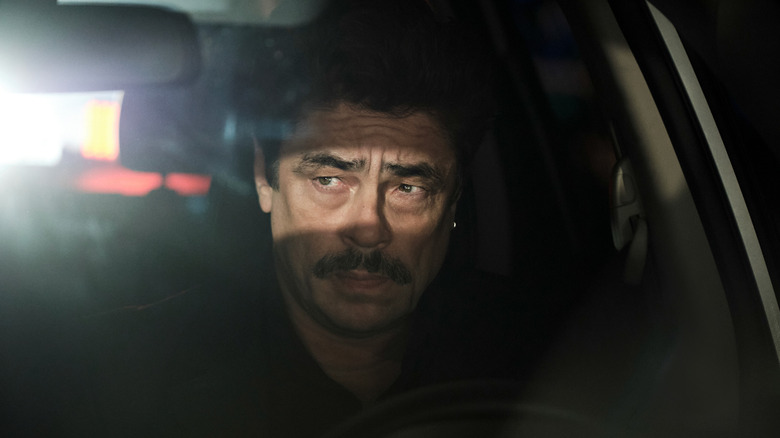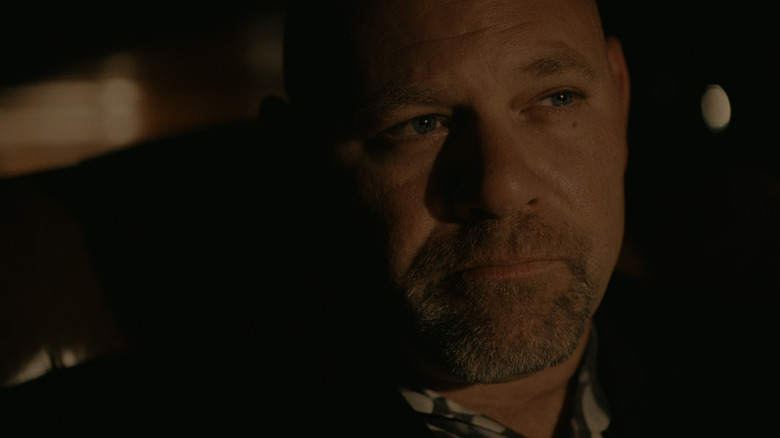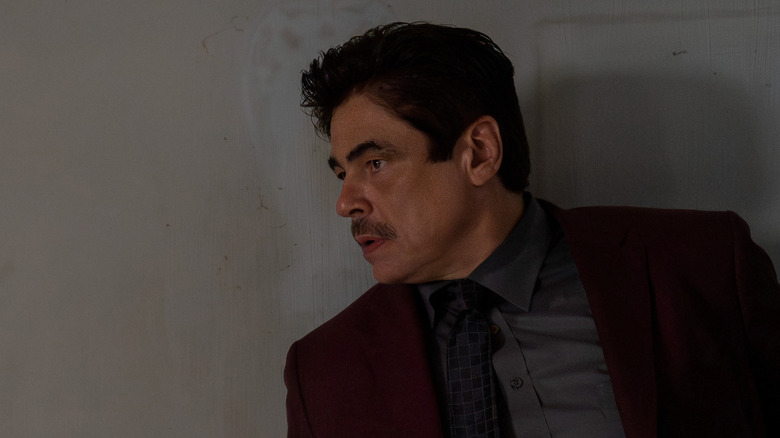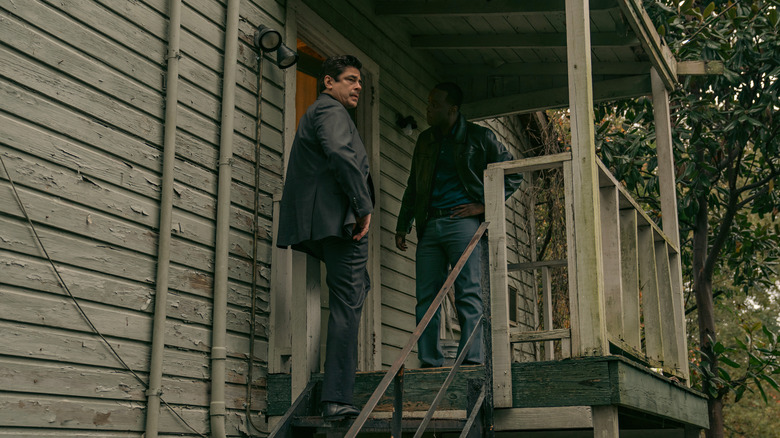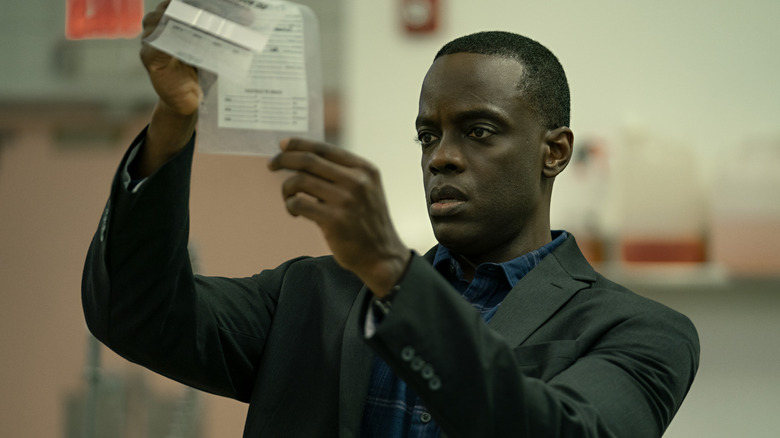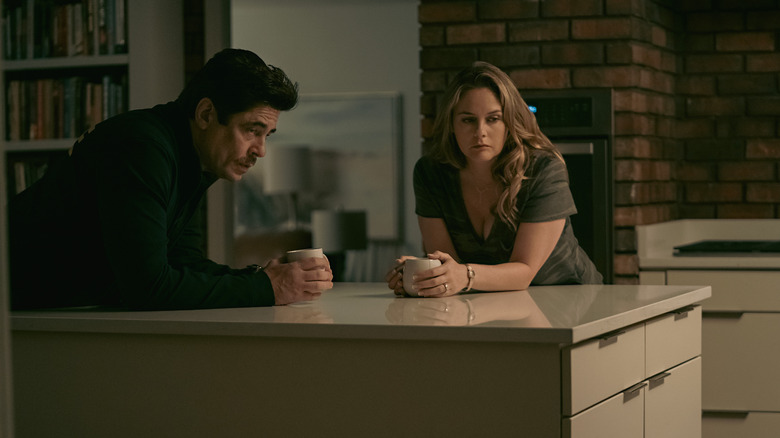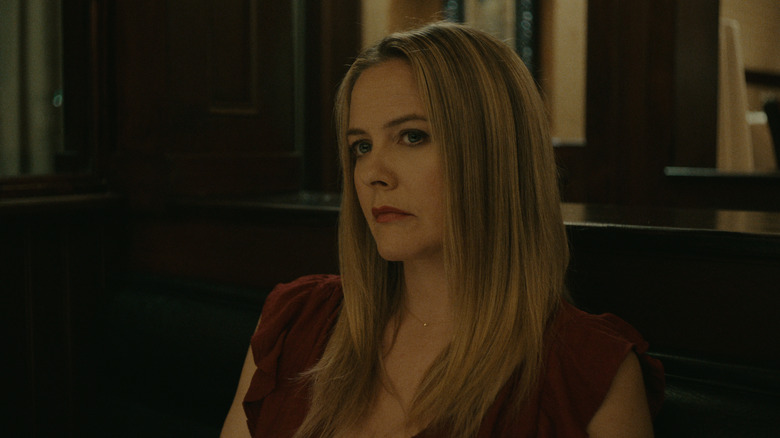The Ending Of Reptile Explained
Netflix kicks off its big fall movie slate with "Reptile." A detective mystery-thriller from writer-director Grant Singer in his directorial debut, "Reptile" features a talented cast and tantalizing thrills. The film follows Tom Nichols (Benicio del Toro), a hardened detective investigating the murder of a real estate agent, Summer Elswick (Matilda Lutz), that turns out to be more than meets the eye. While the case initially involves Tom and his partner, Dan Cleary (Ato Essandoh), looking for potential killers and uncovering new details about Summer's life, Tom eventually finds unexpected motives and a wider conspiracy that puts him in a compromising position. Now, Tom is forced to make decisions that could put him and his wife, Judy (Alicia Silverstone), in grave danger, as these criminals are closer to home than Tom expected.
"Reptile" is a gritty and grounded detective mystery with plenty of sharp twists and turns audiences won't see coming. Although things start pretty simple, Tom's investigation reveals some harsh, shocking realities about his environment. It all leads to a tense finale with deception and danger around every corner. With "Reptile" unleashing so many twists at a rapid pace in its final stretch, it's worth delving into its whole last act to piece everything together. Let's look at the ending of "Reptile" and all the terrifying truths Tom uncovers.
What you need to remember about the plot
Before we delve into the climactic confrontation Tom walks into, let's go over some important details to keep in mind. Tom is a hardened detective tasked with solving the grisly murder of a realtor. Although Tom and his partner, Cleary, initially suspect her boyfriend and business partner, Will (Justin Timberlake), they ultimately believe that Summer's ex-husband, Sam Gifford (Karl Glusman), is the one who killed her. Unfortunately, as they try to arrest him, Tom shoots Sam as he tries to escape, and the suspect bleeds to death.
While most believe the case is closed and shut, Tom can't seem to shake the feeling that something's missing, and he discovers a completely unexpected plot. It turns out that Summer's death is part of a wider conspiracy involving fellow police officers. After Tom's friend Wally (Domenick Lombardozzi) obtains drugs from drug busts, he plants the drugs in houses that Will ends up buying and reselling. Then, all the money gets circulated through fake company names to keep it under wraps.
While Tom is up against insurmountable odds, he believes that he can trust Capt. Robert Allen (Eric Bogosian). That is, until he sees the car that appeared at Summer's murder scene in his garage. The discovery makes Tom's entire perception of his job and fellow officers change completely. Now, he's become incredibly paranoid and turns to someone he believes to be reliable for help — which ends up being a big mistake.
What happened at the end of Reptile
After Tom and Judy get home from Allen's party, he's incredibly paranoid and believes they're in danger. However, Tom has a phone conversation with Allen about meeting up with everyone involved that makes him a little calmer. Since he doesn't want to go alone, though, he enlists the help of Chief Marty Graeber (Mike Pniewski) to go with him to the meeting. When the two arrive at Allen's the next day, the tension is palpable. There's an uneasiness that can't be ignored, and when Marty asks to go to the bathroom, Allen adds a new twist to this whole ordeal. As they head upstairs, Allen turns to Tom and says that he should run since Marty is in on the conspiracy.
With his nerves shaking, Tom is frozen in shock and unsure of what to do next. Then, Allen is shot in the head by Wally, and Tom retaliates by shooting Marty. Soon after, Tom and Wally find themselves in a tense standoff until the silence is broken by a noise — which leads them to shoot at each other. Wally is incredibly wounded to the point where he can't feel his legs, while Tom only suffers a flesh wound. Tom ultimately calls the 911 to bring Wally to justice, and the aftermath of that is briefly shown before the credits roll. Will is arrested by the FBI, and Judy helps Tom heal his hand.
What does the ending mean
The immense bloodshed of the film's final conflict will undoubtedly have lasting ramifications for not only Tom but for the entire world of the film. Tom's sense of trust is shaken now that he's seen how deep the corruption ran in his department and among people he was very close to. Although his wounds are healing and he's able to return to his position at the police department, he will have to rebuild trust with his fellow officers. Honestly, though, the ramifications for the Scarborough police department are far graver.
The film's final conflict saw the department's beloved chief, its highly respected captain, and its likable goofball all be either killed or severely injured. Not to mention, they've all been caught in a major conspiracy that involved drugs pushed around the city and some pretty brutal deaths. The reputation of the department is in shambles, and if they can't find good people to replace the ones they lost, the public could easily turn on them. Tom's entire world and the community he and others have sworn to protect are changed forever, and mistrust has been planted in the relationship between the cops and the public.
Another possible explanation for the ending
Although there's never a scene where Wally, Will, or anyone else involved explains their motivations for concocting this conspiracy, it's clear that greed is the strongest motivator at play. Most of the characters are doing pretty well for themselves — Tom is getting his whole kitchen remodeled, and everyone is seen going out to expensive dinners and parties — but characters like Wally and Will wear their personal greed on their sleeve. Wally isn't afraid to give Tom his very expensive watch, and Will shows that he'll do anything to maintain the success of his family's business. At times, it's almost like they're just toying with Tom and possibly know that he's onto them but just don't care. They're so blinded by their greed that they think they're too good to be caught by him.
Their greed makes them incredibly cocky characters who are willing to flex their power on those they perceive as weaker than them. That greed is what fuels their corruption and this conspiracy that only causes devastation and death to others that they can profit off. "Reptile" is a strong and sometimes gut-wrenching depiction of how greed fuels corruption and the impact it can have on innocent communities.
Why is the movie called Reptile
The film doesn't heavily feature reptiles, nor do they play a role in the plot, but the film's title might have a more subtle meaning. Reptiles shed their skin, and in a metaphorical sense, so do the characters. As Tom uncovers more information on Will and Wally's involvement in Summer's death and this wider conspiracy, their false skins peel away to reveal their true nature. When these two shed their skins, they show hidden, more disturbing layers of themselves.
Another way the title of "Reptile" plays into the film is through the cold-blooded nature of the characters and bloody action. "Reptile" isn't afraid to delve into the brutal actions and horror of this case, and there's this chilling intensity felt the whole time. The entire last stretch is vicious in how these formerly close cops spare no mercy quickly killing one another or leaving these people who were once their friends to face their fates. Overall, "Reptile" has those cold-blooded vibes interwoven throughout its characters, story, and atmosphere, and maybe that's why the title is so fitting.
A redemption arc
Although Tom's persistent when it comes to uncovering the truth and stopping this conspiracy from further hurting people and the community, he wasn't always that way. When we first meet him, Allen mentions that some officers don't completely trust Tom because of his past and that this initially kept him from being put on the case. That past involves Tom's former stint in Philadelphia, where his old partner was arrested for being a part of a corrupt conspiracy. Judy later reveals that they were essentially forced out of Philly after many believed that Tom ratted out his partner and persecuted Tom because of it.
However, Allen's conversation with Wally later in the film suggests otherwise. While it seems like Tom snitched on his old partner, Allen's comment suggests that he actually didn't say anything about it and was forced out once his partner was convicted. Thus, Tom's motivation for stopping this new conspiracy he's come across likely stems not from outing his partner, but from not doing anything at all. Tom's arc in "Reptile" can be seen as one of redemption and making up for his past silence.
Small details with bigger impact
As with many intricate mystery stories, a recurring theme in "Reptile" is never overlooking the small details of a case. Although the case seems pretty cut and dry at first when Sam is killed and all the evidence points to him being Summer's killer, some little details don't add up. From the weird documents that detail a money trail that's tied to the Gradys' realty business to some questions about the murder and the state of Summer's body that were never answered, there's too much left hanging with this case for it to truly be closed. Tom can't let that mysterious paint on Summer's arm or those eerie bite marks slip past him. That's why Tom dives deep into those little unsolved aspects of the case and uncovers a major plot that's been flying under the radar.
The devil is in the details, and those little details can completely change the story — just like they do in the film — and totally shatter what people perceive as the truth. Had Tom just let go of the case and ignored those little details like everyone else, Summer's murder would have just been seen as a closed case.
Old wounds healed
Another aspect of Tom's redemption arc in "Reptile" is the physical healing that aligns with his personal healing. At the start of the film, Tom says multiple times that he has a cut on his hand from a kitchen accident — which does make sense, as his house is going through major renovations. Although it seems like an insignificant detail, the healing wound is a visual representation of him dealing with old wounds throughout the film. Not only is he still wrestling with his past dealings with crooked cops that are replaying in the present, but he's also still contending with his own identity in the force as this new truth tears at his perspective as a cop.
Yet in the end, we see that his wounds have healed and that Judy is now tending to them so that they're gone for good. It's a simple and kind of subtle reminder that Tom has now righted the wrongs of his past and no longer harbors those injuries. So while that cut on Tom's hand might seem trivial, it's a perfect visual pairing with the redemption arc that develops throughout the film for him.
Tom's trust is gone
With how Tom has dealt with incredible corruption throughout his career, you'd think that it would be easy for him to stop being a cop, but it's not that simple. When talking with Judy about being a cop after he becomes paranoid about their safety, Tom says that the only thing he loves nearly as much as he loves her is being a cop. So despite Tom finding that many of the people around him are corrupt and even willing to put a bullet in his head to keep him quiet, his love for what he does likely won't be extinguished.
Tom is the platonic ideal of a good cop: He's the type of detective who upholds the law regardless of who he finds to be the criminal. Who doesn't look past the small details and can't just let a case go until it's truly finished. Who is willing to put his life on the line to make sure that justice is correctly served. Although Tom has faced a lot of corruption and betrayal from the people around him and will likely even have his doubts about Cleary going forward, it's not going to keep him from being a trustworthy cop.
What does the ending mean for a potential sequel
Now for a question that comes after nearly every film nowadays: Could there be a sequel for "Reptile" at some point? Obviously, the film needs to perform well and likely have a long lifespan on Netflix's Top 10 Films list if we're ever going to see a continuation of this story. If Netflix sees that "Reptile" is getting high viewing numbers, like "Red Notice," "Extraction," "Murder Mystery," and "The Old Guard" before it, a sequel could quickly go into development.
In terms of where that story could go, it would be interesting to see the aftermath of the conspiracy being discovered by Tom interwoven with the story of another grisly murder case that's developed. Or maybe the story could go the anthology route and focus on a new cop in a new city dealing with a case that has similar themes of corruption and unexpected turns. Either direction could lead to interesting results and create a grisly detective thriller-mystery franchise akin to something like "True Detective" for Netflix. For now though, neither Netflix nor writer-director Grant Singer has discussed plans to expand "Reptile" or its world into something bigger. So fans should expect this to be a one-and-done film for now.
